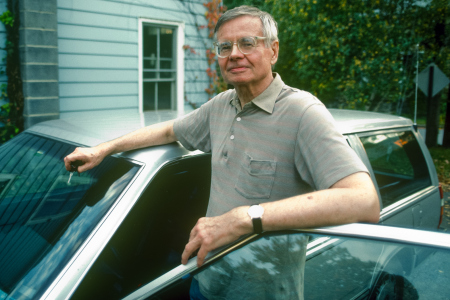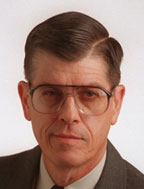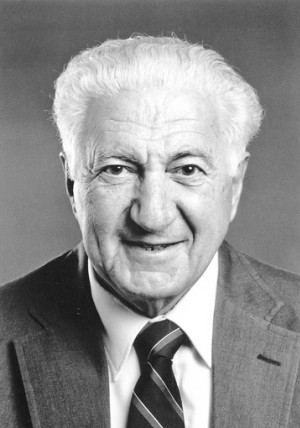By George Verity
With the gentle touch of an iron pen, the epitome of business journalism in the 1900s was transcended by no other than Jack Dierdorff, a man whose journalism career lasted more than seven decades.
Forever known to his colleagues as the editor who never took off his suit jacket or to loosen his tie, the formality of Dierdorff’s presences was never mistaken for nothing less than friendly and supportive — an anomaly among editors .
“Different from any editor I had before, Jack wasn’t rough around the edges — he was refined,” said Joseph Weber, an associate professor of journalism at the University of Nebraska-Lincoln and former colleague at BusinessWeek. “His style was very gentlemen like. In his memos, Jack consistently used the word ‘kindly’ to end each note to reporters regarding any suggestions or corrections.”
Dierdorff’s innate ability to value the integrity of journalists and a higher standard of accountability stems from a long commitment to journalism. Dierdorff’s journalism career began at a small weekly newspaper he created in Portland, Ore., before ending as a consulting editor with the online edition of BusinessWeek.
In 1949, Dierdorff graduated from Yale and returned to Portland as a reporter. Dierdorff later became the assistant editor of The Oregonian newspaper. Dierdorff joined BusinessWeek in 1956 and was managing editor at the time of his retirement in 1993.
“Jack was a commanding presence at BusinessWeek,” said Sarah Bartlett, dean of the CUNY Graduate School of Journalism and a former BusinessWeek staffer. “He was the one who everyone went to when they had an ethical dilemma. He held himself to very high standards and that made everyone around him aspire to meet them as well.”
According to Steve Shepard, former dean at CUNY Graduate School of Journalism and former editor-in-chief of BusinessWeek, Dierdorff was the editor of the front-of-the book section – the 10 pages of news stories that ran near the front of the magazine that were the last to close every week when he started at the magazine. Shepard noted Dierdorff responsibilities were to solicit story ideas from the staff, then nurture the stories along in phone calls and meetings, and finally edit the stories, pick the pictures, brainstorm the charts and graphs.
“He stayed late every Tuesday night and barely had time to breathe all day Wednesday as everything came together,” said Shepard. “To a kid like me, he was a teacher, a gentleman, and a role model. I couldn’t imagine anyone better to work with.”
Shepard added that his decision to come back to BusinessWeek later in his career was because of Dierdorff. Together as editor-in-chief and managing editor in the 1980s, respectively, Shepard and Dierdorff transformed BusinessWeek into a top-notch business journalism publication with a readership that grew to more than 6 million.
“Shepard had the vision, and Jack got things done,” said Weber. “Jack acted as the bridge for BusinessWeek.”
Bartlett added Dierdorff was apolitical and only interested in the betterment of the magazine. He was unflappable in the midst of deadline pressure.
“He could always weigh the pros and cons of a situation with precision and come down on the side of right,” Bartlett noted. “He made it seem effortless, but his ability to navigate thorny problems with such equanimity was impressive.”
Dierdorff who in 1987 testified that McGraw-Hill suspected a leak in of the “Inside Wall Street” column, prompted a review of security procedures of the company’s publication in which he worked for — BusinessWeek.
“Sometimes, it fell to Jack to be the tough cop,” said Shepard.
According to Shepard, Dierdorff contacted him in August 1988, while he was on a trip to Los Angeles. Shepard said Dierdorff received a phone call from the New York Stock Exchange with information implicating the magazine’s radio broadcaster, Rudy Ruderman, in insider trading.
Shepard said Dierdorff confronted Ruderman, who denied the accusations despite the evidence. However, Dierdorff fired Ruderman, and a few months later, Ruderman pleaded guilty to illegal insider trading and was sentenced to six months in jail.
After the McGraw-Hill scandal, Dierdorff received the 1992 Elliot Bell Award from the New York Financial Writers’ Association. Dierdorff then served as a consultant for 15 years, helping the magazine develop its online strategy.
“For a wordsmith who cherished the printed page, Jack was remarkably adept at embracing technological change,” said Shepard. “He helped oversee the pioneering Atex editing system that BusinessWeek adopted in the early 1980s.”
“He was willing to embrace technology and throw himself into the deep end,” said Bartlett. “Very few people would have been so open to that exploration.”
Shepard said Dierdorff was a product of a bygone era.
“I prefer to think that the integrity and values he stood for are really eternal verities, the sort of things we should all aspire to,” said Shepard. “I was proud to be his friend and colleague for so many years. For all of us, he remains a living paragon, an example for the ages.”
Dierdorff died Aug. 8, 2013, at the Baptist Home in Rhinebeck after a long illness. He was 85. Jack’s friend and partner of over 40 years, Alonzo Smith Jr., died in 2011. Dierdorff is survived by his brother David Dierdorff and sister-in-law Madeleine Lefebvre, of Juneau, AK; two nieces; a nephew; and 10 great-nieces and great-nephews.
George Verity is a native of Bay Shore, N.Y., and a public relations major in the Class of 2014 at the University of North Carolina at Chapel Hill.


